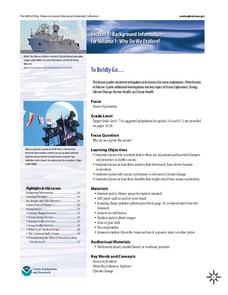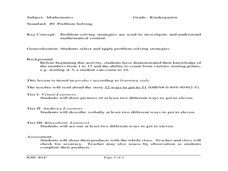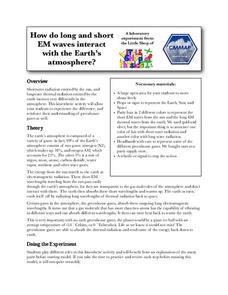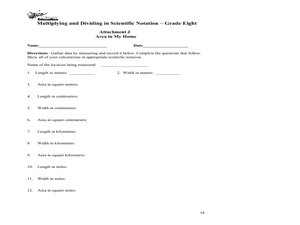Curated OER
Seeing the Image in Imagery: A Lesson Plan Using Film
In our increasingly visual society, it is often difficult for some readers to create a mental picture of a picture created only with words. An image-rich text like F. Scott Fitzgerald's The Great Gatsby can therefore, present a real...
NOAA
To Boldly Go...
When we think of ocean exploration, many of us have visions of sunken pirate ships full of treasure or mysterious creatures of the deep. What really motivates deep-sea investigation? The first in a series of diverse six-part lessons...
Carolina K-12
How Do I Pre-Register and Vote in North Carolina?
Did you know that in some states your pupils can pre-register to vote? Teach the advantages to pre-registering and engage the classroom in an intriguing discussion about youth voting trends. Class members participates in a live polling...
Curated OER
Exploring Magnets and Magnetism
Here is a very good lesson on magnets, magnetism, and magnitic fields that is chock full of great activities for you to implement with your young scientists. Learners discover the properties of magnets, look at the forces of attraction...
Curated OER
Listening and Speaking
Ninth graders practice the elements of narration. In this narration instructional activity, 9th graders complete learning profile activities to address kinesthetic learners, artistic learners, musical learners, and interpersonal...
Curated OER
Reading Word Recognition, Fluency, and Vocabulary
Eleventh graders analyze words that derive meaning from Greek, Roman, and Norse myths. For this myth vocabulary lesson, 11th graders work in learning groups as visual learners, kinesthetic learners, and artistic learners to identify the...
Core Knowledge Foundation
A Time for All Seasons - Summer
The sun is shining and the birds are singing, what better time to teach young learners about the fun season of summer. In this week-long science series, children learn how the rotation and orbit of the earth influence...
Curated OER
Using Rhythm to Teach Patterns and Directions
Introduce young learners to line dancing. Here are some simple movement patterns to teach them. First teach, repeat, and repeat again without music. Then when they have a pretty good grasp of the movement patterns, add music and practice...
Pennsylvania Department of Education
The Digestive System
Fourth graders simulate how the digestive system works. In this hands-on simulation, 4th graders complete six group activities that help students visualize how our body breaks down food into nutrients.
Curated OER
Writing Application: The Canterbury Tales
Students read stories from The Canterbury Tales by Geoffrey Chaucer and create their own tale. In this writing applications lesson, students read the tales and analyze the specific details that Chaucer use. Students work in groups to...
Curated OER
Learning Styles in Math
Students discover which learning style works best for them in a math setting. In this math comprehension lesson, students create different combinations of numbers that equal the sum of 11. Students determine if they are better visual,...
Colorado State University
How Do Long and Short EM Waves Interact with the Earth's Atmosphere?
Things are about to heat up in your classroom! A kinesthetic lesson asks learners to play the part of the gases in the earth's atmosphere and interact with the sun's radiation. The focus is to learn the impact of the increasing...
EngageNY
Vocabulary: Finding the Meaning of Words in Context in The Boy Who Loved Words
Here is a lesson plan that invites learners to engage in a kinesthetic activity that allows them to physically move and manipulate words in order to think about ways to understand vocabulary in context. After that activity is complete,...
Columbus City Schools
Geological Effects of Plate Tectonics
Don't get your classes all shook up about plate movement, instead use a thorough unit that guides learners to an understanding of plate tectonics. The lessons incorporate a study of the types of plate boundaries and their effects on the...
Curated OER
How to Host a Metric Field Day
Celebrate National Metric Week with a fun-filled field day where learners actively apply the metric system.
Curated OER
Water Down the Drain
Did you know that leaky faucets waste $10 million worth of water? Conservationists perform an experiment and draw best-fit lines to explore how the US Geological Society determined this value.
Curated OER
Saltwater: Nifty Aqueous Colorful Layers
A classic investigation on the density of liquids is explained for you in this lesson plan. Te begin, you prepare water samples of different salinities and then add different food coloring to keep them separated and easily identified....
Pingry School
The Periodic Law
Time to put the knowledge to the test! Young scholars take what they know about the periodic table and build their own from scratch. Using clues from 26 different elements, they place elements in a blank periodic table. The clues include...
Alabama Learning Exchange
Exponents and Division
Create a human fraction to learn about division of exponents. Scholars develop the rule for division of exponents by being part of a human fraction to explore and justify the rule. They also consider zero exponents and negative exponents.
Ohio Department of Education
Multiplying and Dividing in Scientific Notation - Grade 8
Here is really nice set of resources on scientific notation. Eighth and ninth graders explore the concept of multiplying and dividing in scientific notation. In this multiplying and dividing numbers in scientific notation...
Curated OER
Yummy Gummy Subtraction
Here is a quick 15 minute instructional activity intended to introduce subtraction. Learners count and subtract gummy bears to complete 5 problems. The lessons suggest that the gummy bears can be saved and used the next day, but gummy...
Curated OER
Things in a Line
Little learners recognize symbols, objects and how to depict numbers. In this matching lesson, they can match the number names with a set of items, model ordinal numbers, and complete a cute, cartoon-character worksheet.
Hawaiʻi State Department of Education
Symmetrical Objects
In order to better understand how to locate a plane of symmetry in 3-dimensional objects, learners create a dance. The class reviews dance and math symmetry, then they practice making symmetrical shapes and movements with a partner....
NOAA
Individual Species in the Deep Sea
A tube worm's outer covering is made of chitin, the same material that makes up the shells of lobsters and crabs. Scholars create tube worms and analyze and discuss the longevity of organisms living near cold seeps. They then discuss and...

























